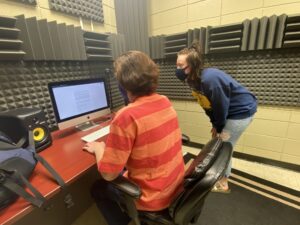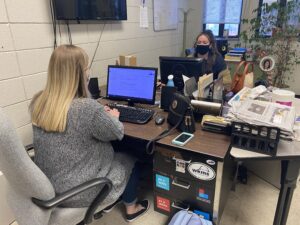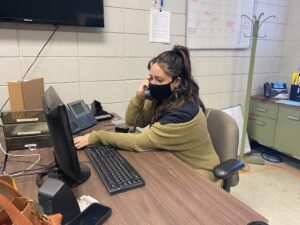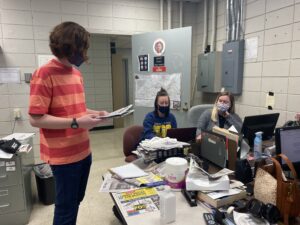Dionte Berry
Features Editor
dberry11@murraystate.edu
Gaining experience in their areas of study is important for college students, so the journalism and mass communications department is collaborating with WKMS to give students the opportunity to get experience diving into the world of investigative journalism.
The first time investigative journalism fellowship with Murray State’s NPR Station WKMS chose students to partake in the experience starting in January of the spring 2021 semester. Four students were selected by the journalism faculty for the fellowship: Kati Wyant, sophomore journalism major; Edie Greenberg, senior journalism major; Dustin Wilcox, junior journalism major; and Molly Dowell, senior organized communications major.

Jared Bennett, a reporter from the Kentucky Center of Investigative Reporting, was appointed to guide the students and teach them the ropes of investigative reporting.
Bennett took on the responsibility of the fellowship when WKMS reached out to KYCIR to find any reporters interested in helping out with the fellowship at Murray State as a resident journalist.
With the fellowship’s first year underway, Bennett is happy with how it is going so far and is taking advantage of just going with the flow and not maintaining any stringent standards.
“Since it is the first time it is being done we are figuring out what we can do,” Bennett said. “While we were thinking of stories to do there was a lot of adjusting as we go because there is not a set playbook, so we have had the luxury of being able to figure things out.”
For their first investigative story, the fellows have been focusing on the Kentucky legislative session.
“Covering the state legislature is where I first learned how to do accountability and investigative journalism,” Bennett said. “There are a lot of documents and a lot of information that doesn’t always get the attention it should from the news media.”
The fellows started by analyzing lobbying and campaign finance records to find out what is happening in the Kentucky 2021 legislative session.
From the research done this far, the fellows have been developing articles that explain and give insight into the operations behind Kentucky law.
The fellowship highlights the importance of gathering data for investigative reporting as well as the struggles that may come along with it.
Bennett was happy to take on the fellowship within the journalism field because getting early experience can be pivotal in how students learn and apply content.
“Journalism is a hard skill to learn in the classroom, I didn’t have something like this when I was an undergraduate,” Bennett said. “It’s exciting to give students the opportunity to show them what it looks like doing what they learned in class.”
The fellows also have weekly class sessions where they learn skills such as how to track lobbying money, campaign finances, donations and legislation as well as go over interview skills.
Wyant was happy to be selected, especially as a member of the first group to go through the fellowship.
“For a couple of years I have done reporting for class and was a freelance writer for a newspaper, but being here I have learned more skills in interviewing and investigating,” Wyant said. “It has changed my idea of day-to-day reporting, and it is nice to actively apply those skills.”

A big part of the fellowship has been researching and practicing data journalism, which is a branch of journalism that relies on the gathering of numerical information.
Wyant has spent a lot of time downloading data sheets and putting it into Excel worksheets, tracking bills to see what they are dealing with and creating charts and infographics to make the information more understandable for readers.
Aside from taking in more journalism skills, Wyant has also grown more familiar with how the Kentucky government works.
Becoming acquainted with another side of journalism has given Wyant a different outlook on her possible career prospects.
“I have liked broadcast journalism from a distance, such as NPR,” Wyant said. “Now I have a better understanding and appreciation of what the broadcast process is and how these stories are put together to go on air.”
Having a broadened picture of journalism, Wyant sees herself possibly covering local government because she sees it as a space of journalism that is not well covered, but plays a big role in people’s lives so she’d like to highlight it. Wyant wants people to know what their government is doing in order to make an informed public.
Wyant has been thankful for the experiences she has had during the fellowship, and it has motivated her to look into other work experiences.
“I want to start doing other internships over the summer and just keep trying to get more experience at different types of organizations so that I can come away with an idea of what I want to start out with after I graduate,” she said.
Wyant has been gathering data and writing alongside Wilcox. The two have been working on their article together.
Like Wyant, Wilcox was excited to be notified of his selection.
“I appreciated being selected by the faculty,” Wilcox said. “When I was asked I thought it was one of the best opportunities so I took it.”
However, Wilcox did have slight nerves about taking on the fellowship, because although he had journalism experience, he had never done anything to this extent, and he felt that he was jumping into something bigger than what he had done in class.
Despite the slight apprehension, Wilcox took the opportunity and is now getting experience that is applicable to the real journalism world.
“The fellowship has been very experience based,”Wilcox said. “We spend 10 hours a week calling people, writing and researching. Now that we are a few months in I really enjoy the work.”
A big takeaway Wilcox has had is the prevalence of data and how it can be used to push and create a story. He has been examining data working on an article that has involved him examining campaign funds and lobbying records.
Both Wilcox and Wyant set out on leads concerning lobbying in Kentucky, so they decided to do a collaboration.
“I set out to talk to the top 10 lobbying groups in Kentucky and develop a story from there, and after I talked to those bigger groups I found that Kati had been talking to smaller groups that have had vastly different experiences,” Wilcox said. “We wanted to bring together a story about major lobbying groups and smaller grassroots movements to paint a holistic picture of how political activism has looked in 2021.”

Taking this dive into journalism, it has shown him more about the field and himself as a journalist.
“I know I enjoy doing journalism at least 10 hours a week, so that is a plus,” Wilcox said. “It definitely has shown me that journalism can be a force for good by bringing important information to the light.”
Before the fellowship and beyond classes, Wilcox has had experience with trade journalism, and he writes about arcade games for a blog and a magazine that covers the arcade industry.
With this newfound perspective of journalism, Wilcox wants to bring aspects of investigative reporting to what he already does.
Dowell and Greenberg have teamed up to create a story as well.
Out of the bunch, Dowell is the only one that is not a journalism major, but she got into the fellowship through her mass communications minor.
“With my minor in mass communications, I have taken public relations classes and news writing classes,” Dowell said. “Last semester I was in a journalism class, and my professor said she would love for me to be in a fellowship that was being put together.”
Dowell’s class was doing audio pieces and her professor said she had a good voice and thought the fellowship would be a good fit for her.
Although it may not be along her projected career path, Dowell said yes to the offer because she is open to new experiences and obtaining skills that may help her on the career path she decides to take.
Not being a journalism major did make her nervous about taking on the fellowship as well as it being the first year the fellowship was offered.
“Doing something for the first time with all of these journalism majors and people that work in the field was intimidating, but I have gotten a lot of help from Jared and the other fellows so since I’ve started those nerves have gone away,” Dowell said.
After overcoming the nerves, she has come to learn a lot, and her experience so far has also impacted her career prospects, or at least her plan B.
For her capstone organizational communication class Dowell needs to have a plan A and a plan B of what she wants to do after school.
Dowell’s plan A is to go to graduate school for organizational communication. Her plan B is to be a local journalist.
“Before this opportunity I don’t think being a journalist would have been in my radar,” Dowell said.
Overall, Dowell describes the fellowship as a learning process. Going into her story about the Kentucky legislature she did not have much knowledge about the legislative process.
Dowell was able to apply what she had learned in some of her classes, but she saw that it was far from what she did in class.
“I had the rudimentary skills that I had learned in some journalism classes, but really applying those skills is way different than simply submitting an assignment on Canvas,” Dowell said. “I have never had to make phone calls for stories I’ve written in classes. I’ve texted friends or emailed professors, but reaching out to legislators, representatives and senators asks a lot more such as research and knowing that topic that you are asking them about.”
Dowell is also becoming familiar with writing an article with someone else and collaborating.
Greenberg said she was honored and grateful to be selected as a “guinea pig” for the fellowships first year.

As a senior, Greenberg has a wide range of knowledge regarding journalism and the fellowship is giving her an avenue to apply it.
However, investigative and radio journalism is newer to Greenberg.
“Investigative journalism is definitely different from the news and solutions reporting I have done in the past,” Greenberg said. “Compared to the other reporting forms, investigative is about really digging in and finding those details that people might not think to look for at first but that really help push a story.”
Greenberg and Dowell started their story in the beginning of February. They are still working on getting fine details, ensuring accuracy and getting quotes.
Doing all of this work, Greenberg appreciates that she is able to get a glimpse of what investigative journalism looks like.
“I’ve done a lot of features journalism in the past and a lot of broadcast journalism, and this fellowship is showing me a part that I don’t know if I would be able to do if I was not taking part in this fellowship,” Greenberg said.
Through the fellowship she has also found out more about herself and her own career plans.
“I am extremely grateful for this opportunity, but I don’t see myself pursuing investigative journalism,” Greenberg said. “It has solidified that I don’t want to go into investigative journalism, but I do have such a strong appreciation for everyone in the field.”
Despite not thinking investigative journalism is a good fit for her, Greenberg does think that anybody interested in the field should look to the fellowship as a way to get experience and test the waters of investigative journalism.
The stories the fellows are working on will be published in text and radio versions that will air on WKMS.